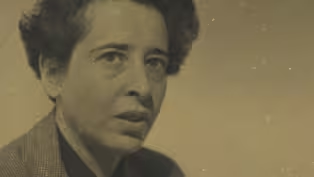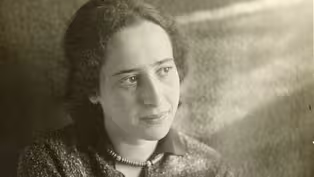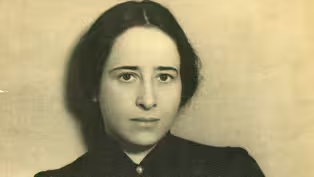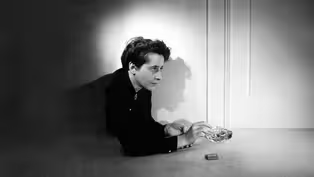
What sparked Hannah Arendt's ideas behind "The Origins of Totalitarianism"
Clip: 6/27/2025 | 2m 49sVideo has Closed Captions
Hannah Arendt came up with ideas for “The Origins of Totalitarianism” while observing Hitler.
Adolf Hitler projected his own narrative into his campaign speeches, giving his followers a coherent story that the Nazi movement was winning, even when they weren’t. Hannah Arendt began to come up with ideas for “The Origins of Totalitarianism” while observing what Hitler provided his followers: “The Nazis translated the propaganda lies of the movement into a functioning reality.”
Problems playing video? | Closed Captioning Feedback
Problems playing video? | Closed Captioning Feedback
Support for American Masters is provided by the Corporation for Public Broadcasting, AARP, Rosalind P. Walter Foundation, Judith and Burton Resnick, Blanche and Hayward Cirker Charitable Lead Annuity Trust, Koo...

What sparked Hannah Arendt's ideas behind "The Origins of Totalitarianism"
Clip: 6/27/2025 | 2m 49sVideo has Closed Captions
Adolf Hitler projected his own narrative into his campaign speeches, giving his followers a coherent story that the Nazi movement was winning, even when they weren’t. Hannah Arendt began to come up with ideas for “The Origins of Totalitarianism” while observing what Hitler provided his followers: “The Nazis translated the propaganda lies of the movement into a functioning reality.”
Problems playing video? | Closed Captioning Feedback
How to Watch American Masters
American Masters is available to stream on pbs.org and the free PBS App, available on iPhone, Apple TV, Android TV, Android smartphones, Amazon Fire TV, Amazon Fire Tablet, Roku, Samsung Smart TV, and Vizio.
Buy Now

A front row seat to the creative process
How do today’s masters create their art? Each episode an artist reveals how they brought their creative work to life. Hear from artists across disciplines, like actor Joseph Gordon-Levitt, singer-songwriter Jewel, author Min Jin Lee, and more on our podcast "American Masters: Creative Spark."Providing Support for PBS.org
Learn Moreabout PBS online sponsorship(plane whirring) - [Roger Berkowitz] There were federal and regional elections at the time, and if you look at Hitler's speeches during the campaigns, he would say things like, "We are a majority."
He was never a majority, and he would come up with some argument that they won.
He was giving them a coherent narrative.
We are winning.
We are gonna change Germany.
We are gonna change the world.
And the movement is growing and it's stronger because of you and your undying loyalty to me.
(tense music) - [Narrator] The Nazis translated the propaganda lies of the movement into a functioning reality.
The ideal subject was not the convinced Nazi, but people for whom the distinction between fact and fiction no longer existed.
A most cherished, virtuous loyalty to the leader who, like a talisman assures that ultimate victory of lie and fiction over truth and reality.
- Arendt saw this.
She was there.
She was living there, and so many of her friends said, "Oh, well, he's just crazy.
"He's just making things up."
And "Don't worry about him.
"He can't win.
"He's just creating fantasies."
But fantasies are sometimes what we want.
And especially at times of economic, cultural, social, and political despair, people, they were lonely.
They were needy of meaning and belonging, and that's what Hitler was giving people.
(uneasy music) - [Narrator] The Nazi movement recruited their members from this mass of indifferent people whom all other parties had given up as too apathetic or too stupid for their attention.
The result was that the majority of their membership consisted of people who never before had appeared on the political scene.
(people cheering) - I think she came up with these ideas when she was looking at what this mass society would provide people.
It would provide them with the impression that they're not alone anymore, and there is a party giving them an idea that they are part of something really big.
(people shouting)
Video has Closed Captions
Preview: 6/27/2025 | 2m | Discover Hannah Arendt, one of the most fearless political writers of modern times. (2m)
Hannah Arendt’s reflections on being a refugee
Video has Closed Captions
Clip: 6/27/2025 | 1m 14s | Hannah Arendt became a stateless person in 1933 upon fleeing Germany to France. (1m 14s)
How Hannah Arendt developed the concept of "the banality of evil"
Video has Closed Captions
Clip: 6/27/2025 | 3m 39s | Hannah Arendt came up with the concept of “the banality of evil” during the trial of Adolf Eichmann. (3m 39s)
Why McCarthyism was familiar to Hannah Arendt
Video has Closed Captions
Clip: 6/27/2025 | 2m | Hannah Arendt was teaching at Berkeley when McCarthyism took hold of the United States. (2m)
Providing Support for PBS.org
Learn Moreabout PBS online sponsorshipSupport for PBS provided by:
Support for American Masters is provided by the Corporation for Public Broadcasting, AARP, Rosalind P. Walter Foundation, Judith and Burton Resnick, Blanche and Hayward Cirker Charitable Lead Annuity Trust, Koo...




















